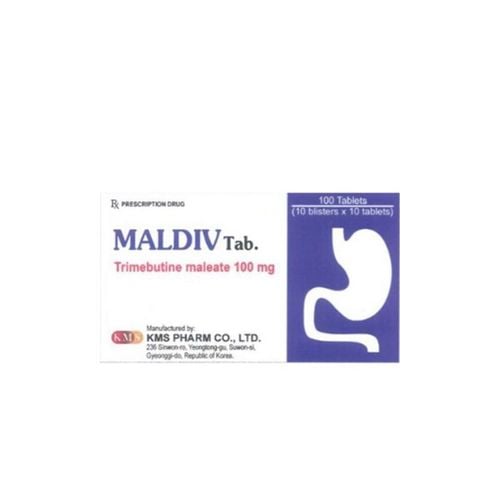This is an automatically translated article.
Post by Master, Doctor Mai Vien Phuong - Head of Department of Gastrointestinal Endoscopy - Department of Medical Examination & Internal Medicine - Vinmec Central Park International General HospitalEndometriosis and irritable bowel syndrome (IBS) are two conditions with similar symptoms. Doctors also know that women with endometriosis are more likely to have irritable bowel syndrome. So are these two diseases actually related?
1. What is endometriosis and what is irritable bowel syndrome?
1.1 Endometriosis Endometriosis is a condition in which tissue normally found only in the uterus begins to grow in other areas of the body. Examples of these areas include the fallopian tubes and ovaries. Endometrial tissue can also grow in the intestines. This can contribute to irritable bowel syndrome-like symptoms.
1.2 Irritable Bowel Syndrome Irritable bowel syndrome causes abdominal symptoms. These include constipation, diarrhea, or both. However, this condition does not damage a person's intestines like ulcerative colitis or Crohn's disease. Many women with endometriosis in the bowel and other nearby structures are often misdiagnosed with irritable bowel syndrome.
1.3 What are the symptoms like? Endometriosis and irritable bowel syndrome share common symptoms such as bloating, abdominal pain, nausea, and pain during bowel movements. This overlap can be a challenge for physicians trying to find. attempt to diagnose the source of the patient's pain and discomfort. A common symptom of both conditions is organ sensitivity. This means that people with either condition have a lower pain tolerance for abdominal or pelvic pain. Their nerve endings can be especially sensitive. This can lead to a strong response to pain.
Doctors don't know exactly what causes endometriosis. They know the condition has a genetic component, but little is left about why some develop the condition and others do not. Irritable bowel syndrome is a similar mystery to doctors. They know that inflammation can lead to irritable bowel syndrome. Some people also develop irritable bowel syndrome after a bacterial or viral infection, which can lead to chronic intestinal inflammation.

2. How is endometriosis and irritable bowel syndrome diagnosed?
Doctors don't just have one test that diagnoses both conditions. When diagnosing irritable bowel syndrome, doctors often try to rule out other medical conditions that cause similar symptoms. These include:
Gluten intolerance Infectious diseases Inflammatory bowel disease, such as ulcerative colitis or Crohn's disease Lactose intolerance The doctor may order blood tests to determine if a person has these compounds inflammation may indicate gluten or lactose intolerance. They may also order a stool sample to test the stool for blood or infectious organisms. Sometimes your doctor may recommend an upper endoscopy or a colonoscopy. These are tests that allow your doctor to see the lining of your esophagus, stomach, and colon to identify any abnormalities. Doctors can use a variety of methods to diagnose endometriosis. Examples of these include:
Pelvic exam. Your doctor may perform a pelvic exam to feel for areas of scarring. Imaging tests. An MRI or ultrasound can help your doctor see if there are cysts or endometriosis-like thickening in the uterus or other areas. Medicine. Your doctor may prescribe hormonal medications to relieve endometriosis symptoms. If your symptoms improve, the condition could be endometriosis. Laparoscopic abdominal surgery. The only sure way to confirm endometriosis is by laparoscopy. This involves removing a portion of the underlying abnormal tissue and testing it in a laboratory for the presence of uterine tissue. Your doctor will discuss these diagnostic methods with you. They will then use the results to make treatment recommendations.
3. What are the treatment options for endometriosis and IBS?
Doctors still don't have a cure for endometriosis, but treatments can help control the condition. Without treatment, you may be at greater risk of health complications. While these are not likely to cause death, they can reduce your quality of life. Besides, the treatment for endometriosis depends on the location of the abnormal cells in your body.
If endometriosis affects the intestines, your doctor may prescribe hormone treatment first. These include birth control pills or an intrauterine device (IUD). Additional hormones can correct problems such as cramping and bleeding.
If hormones do not relieve symptoms, your doctor may recommend surgery to remove areas where endometrial tissue grows. If you are concerned about fertility, surgery may also help.
To treat irritable bowel syndrome, your doctor may prescribe medication depending on your symptoms. Examples include:
Antidepressants . These include selective serotonin reuptake inhibitors (SSRIs), such as citalopram (Celexa), fluoxetine (Prozac), or sertraline (Zoloft) as well as tricyclic antidepressants, such as amitriptyline (Elavil) ). Anti-diarrheal medication. These include loperamide, rifaximin, or eluxadoline (Viberzi). Medicines for constipation. These include laxatives, lubiprostone (Amitiza), linaclotide (Linzess), or plecanatide (Trulance). In addition to prescription medication, your doctor may also recommend therapy if stress is the cause of an irritable bowel syndrome flare-up. A therapist can suggest methods that can help a person respond better to stress.

4. Home Remedies
Home remedies for endometriosis often involve easing pelvic or abdominal symptoms. Over-the-counter pain relievers, such as ibuprofen or acetaminophen, can relieve pain. Applying heat or cold compresses to the lower abdomen can help relieve cramps.
Make some dietary changes that can help treat irritable bowel syndrome. Consider the following:
Eat foods that are low in preservatives and artificial flavors and colors. This approach is part of the low-FODMAP diet. Incorporate more fiber into your diet. Limit your intake of gluten-containing foods. Take probiotics to incorporate healthy bacteria into the gut. Taking steps to reduce stress may also help some people with irritable bowel syndrome. These may include regular physical activity and meditation.
Although endometriosis and irritable bowel syndrome have no current cure, both conditions can be managed successfully. In addition to the link between endometriosis and irritable bowel syndrome, doctors have linked endometriosis to higher rates of other conditions. Includes:
allergic reactions asthma autoimmune disorders, including multiple sclerosis and lupus cancers, such as breast or ovarian cancer Chronic fatigue syndrome fibromyalgia Discuss these risks and conditions with your doctor if you have endometriosis.
Currently, the treatment of endometriosis symptoms can include a combination of home care, medication, and surgery. Treatments usually depend on the severity of symptoms.
If you have endometriosis and irritable bowel syndrome, you are not alone. The Endometriosis Foundation of America Foundation of America estimates that 10% of women in the United States of America have endometriosis endometriosis. Recent research also estimates that women with endometriosis are 2.5 times more likely to develop irritable bowel syndrome. Seeking treatment for either or both conditions can help improve your quality of life.
Please dial HOTLINE for more information or register for an appointment HERE. Download MyVinmec app to make appointments faster and to manage your bookings easily.














